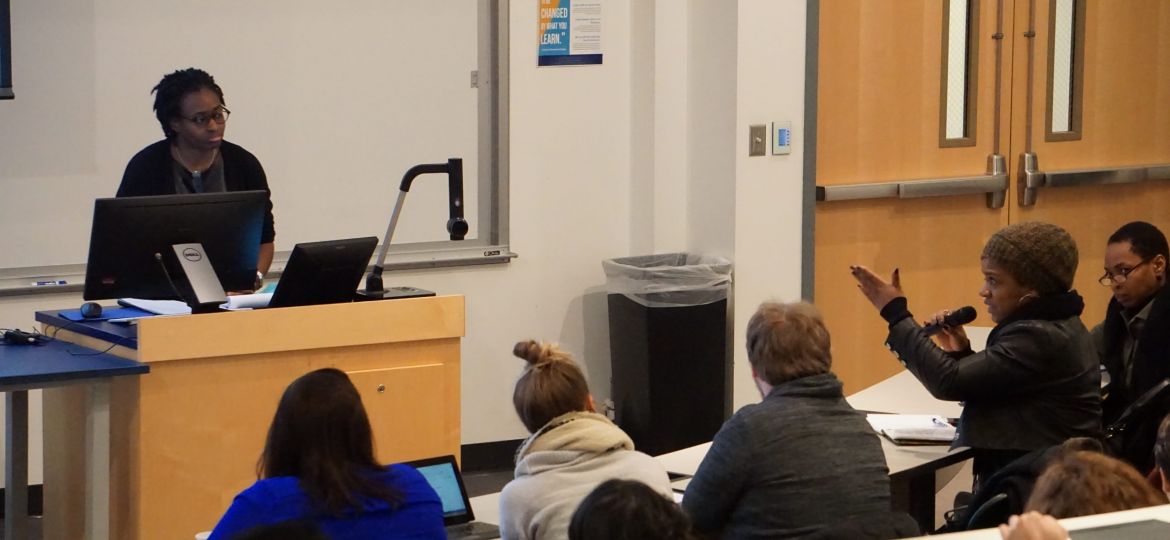
St. Olaf College hosted the second biennial Diversity, Decolonization, and the German Curriculum (DDGC) Conference March 1-3. German faculty members and graduate students from across the nation gathered in Northfield to discuss how to further shape German studies as a more inclusive and socially critical foreign language curriculum.
The first DDGC Conference was held two years ago at the University of North Carolina – Asheville. It served as the first conference of the DDGC to ask the question, “How are a diversity of perspectives reflected within the German canon, to properly reflect the diversity of modern Germany?”
Kathryn Sederberg, Assistant Professor of German at Kalamazoo College, and Amanda Randall, Assistant Professor of German at St. Olaf College, worked to organize the second DDGC Conference.
Randall was one of the participants in the inaugural conference in North Carolina.
“The first conference was really influential for me,” Randall said. “So when a call went out to host the next conference, I raised my hand. I thought St. Olaf would be a great place to host.”
Randall explained the extensive planning that she and Sederberg undertook to prepare for the conference in the months leading up to the early March date. The two professors hold a shared interest in German diversity and decolonization, and Randall believes their work is important and worthwhile.
“We’ve been working together for a while to put together a good program,” Randall said. “We got over 60 applicants who wanted to contribute in various ways, from serving on a panel to roundtable discussions.”
The canon of German studies has been criticized in the past for its lack of diversity, and Randall believes that diversifying this canon is something the conference can work towards.
“It is critical to not sequester different identities – that was the missing piece for me,” Randall said. “Diversity often meant, ‘here is the canon, and here is an adjacent canon.’ There was diversity, but it was not all considered part of the mainstream. Now, thanks to the work done at a conference such as this, there is a definite shift on what is considered canonical, to include and center these voices from a diversity of identities.”
The two highlights of the conference were a screening of the film “Milli’s Awakening” with director Natasha Kelly on Feb. 28 and a keynote address entitled “On Racism Without Race: The Need to Diversify German Studies,” presented by Priscilla Layne, Associate Professor of German at the University of North Carolina – Chapel Hill March 1.
“It is critical to not sequester different identities – that was the missing piece for me.” – Amanda Randall
During her keynote address, Layne addressed the question, “What would make a student not take German?” In response, Layne urged that it is an issue of representation.
“What I’ve learned from teaching German studies in the U.S. is how important representation is for German students of color,” Layne said.
Layne also alluded to the fact that these ideas of diversity and decolonization are part of a larger movement in humanities curricula.
“Black studies is the study of the human condition, not a niche field,” Layne said. “I don’t have to teach a class on race or ethnic studies to include works by people of color.”
Randall also expanded on the universality of these issues within the broader foreign language and humanities curricula and stressed the importance of embracing diversity for the betterment of humanities as a whole.
“It stands to reason that enrollments are not sustaining in German studies at the college level because the field is not attracting a broad enough base of students,” Randall said. “It is important in and of itself to invite diversity and inclusion, but also because the future of the humanities and German studies relies on diversification. Diversity is an important, salient conversation happening all across the humanities.”
Alongside the film screening and the keynote address, the conference also included discussions of diversification in textbooks, round-tables on key topics such as ‘who are students that take German?’ and a discussion with faculty attendees on curricular goals and the future of diversity and decolonization in German studies.
“To bring diversity as an important priority, we hope that teachers at the national level will be more inclined to include [diversity] in their German and foreign language curricula,” Randall said. “In the most broad sense, we are talking about all different kinds of intersectional identities that are critical for the future of not only German studies but humanities programs as a whole.”

